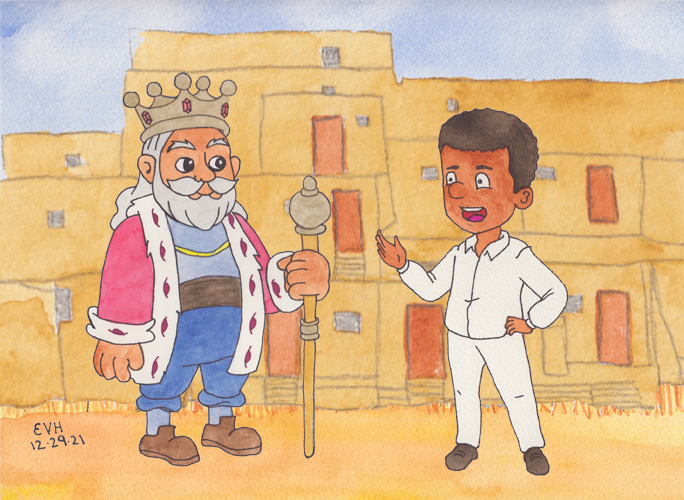
Jataka 290
Sīla Vīmaṃsa Jātaka
The Test of Virtue
as told by Eric Van Horn
originally translated by William Henry Denham Rouse, Cambridge University
originally edited by Professor Edward Byles Cowell, Cambridge University
This is essentially the same story as Jātaka 86. I find this rendering of the story a little confusing. The idea is that the brahmin chaplain wants to find out if his privileged status is due to his family background or because of his virtue. Because the King punishes him for his indiscretion, he determines that his status is due to his virtue and not his family. This would have been a radical notion in India at that time, and it would be just as radical today in a country where a person’s family is everything.
“Virtue is lovely.” The Master told this story at Jetavana. It is about a brahmin who put his reputation to the test. The circumstances which gave rise to it, and the story itself, are both given in the Silavīmaṁsa Jātaka (Jātaka 86).
When Brahmadatta was the King of Benares, his chaplain resolved to test his own reputation for virtue. On two consecutive days he took a coin from the Treasurer’s counter. On the third day they dragged him to the King and accused him of theft. On the way he noticed some snake charmers doing a snake dance. The King asked him what he had done such a thing for. The brahmin replied, “To test my reputation for virtue,” and then he said:
“Virtue is lovely—so the people deem—
Virtue in all the world is held supreme.
Behold! This deadly snake they do not slay,
‘For he is good,’ they say.
“Here I proclaim how virtue is all-blessed
And lovely in the world, whereof possessed.
He that is virtuous evermore is said
Perfection’s path to tread.
“To kinsfolk dear, he shines among his friends,
And when his union with the body ends,
He that to practice virtue has been fain
In heaven is born again.”
Having thus in three stanzas declared the beauty of virtue and paid homage to them, the Bodhisatta went on, “Great King, a good deal has been given to you by my family. This includes my father’s property, my mother’s, and what I have gained myself. There is no end to it. But I took these coins from the treasury to test my own value. Now I see how worthless birth and lineage, blood and family is in this world, and how virtue is the best. I will embrace the holy life. Allow me to do this!” After a great deal of pleading, the King at last agreed. The chaplain left the world. He retired to the Himalaya Mountains where he took up the holy life. He cultivated the Five Faculties (1) faith/confidence, 2) energy, 3) mindfulness, 4) concentration/samadhi and 5) wisdom/insight) and the Attainments (jhānas) until finally he was reborn Brahma’s world.

Figure: Explaining the test of virtue
When the Master ended this discourse, he identified the birth: “At that time the brahmin was Ānanda, and I was the King.”
